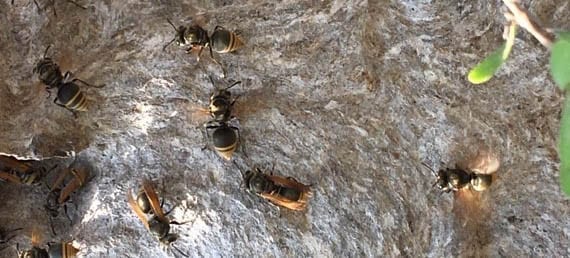
Mexican honey wasps are so tiny you have probably never observed one. They are, however, the only wasp species that produces honey, are useful pollinators and eat insects that harm citrus crops.
Observing a Mexican honey wasp requires a sharp eye because it is only 1/4 to 1/3 inch long. The body is shaped like most wasps but with a rather bulbous abdomen. The body is all black except for some yellow bands at the end of the abdomen. The wings are membraneous and have a rusty-gold color.
We all know that bees produce honey but it is surprising to find a wasp that does. Studies have shown that the wasp’s honey is an almost exact match to bee honey. In the Mexican town of Popoluca they call the wasps “Cuchii” and they not only enjoy eating the wasp’s honey but consider the wasp’s larvae to be a delicious delicacy.
Because their bodies are a bit hairy, when foraging for food, they make good pollinators and are especially useful in pollinating avocados. These wasp’s nests also can be found in citrus groves where thankfully they prey on Diaphorina citri, an insect that causes citrus greening which makes the fruit inedible and slowly kills the trees.
Their grey, papery nests are built in trees up to 25 or more feet from the ground and so are usually not a problem. The wasps are not aggressive unless actively disturbed. Sometimes orchardists cut branches and relocate the nests in which case protective bee suits are needed. The female wasps can sting. Citrus growers also have to remove nests during harvesting season.
Mexican honey wasps are social insects and a nest’s population may eventually grow to 18,000. Like many social insects they have a division of labor. A nest will have numerous queens and workers involved in a variety tasks. From time to time a queen and a few workers will depart to establish a new colony.
Here in Texas we have only 1 of the 16 species of honey wasps, Brachygastra mellifica. It is also found in Arizona and down to Nicaragua. They are tiny but interesting inhabitants of the Valley and are quite beneficial. Maybe you will see one while out on a walk in our native brush!
